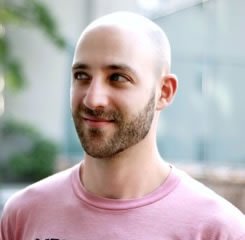Behavioral Scientist Receives Support for AIDS Research
 |
| Photo: Bryan Kutner |
Bryan Kutner is a fourth year clinical student working with Jane Simoni. He applied for and received a training grant supported by UW's Center for AIDS Research (CFAR).
Let's start with the basics, where are you from and where did you complete undergrad/master's?
I’m from the Lone Star State (aka secession capital of the U.S.): Texas. I completed a BA in Sociology at Yale University and an MPH in Epidemiology at Columbia University Mailman School of Public Health
How did you wind up at UW/why did you apply here? What do you think about living in Seattle?
As I went through the MPH program, I started to work within an implementation study on motivational interviewing for community based drug treatment counselors. That just whet my appetite to learn more about evidence based clinical practices. I realized I'd get two birds with one stone in clinical psychology: advanced training in research methods plus clinical training in the implementation of evidence based practices. I searched for programs where I was living, in New York, but when I visited UW the deal was sealed. It was just the right fit!
How did you learn about your funding opportunity and tell us about the application/waiting process?
I saw an announcement on the listserv from the Center for AIDS Research (CFAR) at UW. I wasn’t going to apply because I’d been told they rarely if ever had awarded a behavioral scientist. But my advisor, Jane Simoni, is always encouraging so I applied anyway.
How did you feel when you learned that your application was accepted and that you will receive funding?
I was on the train to SEA-TAC when my phone buzzed with a message from a labmate congratulating me. I was so relieved. I also thought, “Now I can just get cracking on my research!"
Do you have any advice/tips/suggestions for others who may apply to this opportunity? About graduate study in general?
I’d applied for an F31/NRSA and my proposal was not discussed. I had some excellent feedback from the reviewers and was about to start working on a resubmission. Then this other grant came through. If anything, don’t stop taking feedback and improving your proposal. And give your peers lots of encouragement too. If I hadn’t had cheerleaders in my lab, cohort and the Department, I might have been discouraged by one grant's outcome. Instead, I was invigorated, took it as a sign to improve, and then got rewarded for it.
What do you like doing in your spare time?
I love growing houseplants, cooking, electoral politics, and antiracism. I also like mindfulness meditation retreats. And long walks on the beach. (Not that last part — gag!)
The last book and/or movie you saw and enjoyed?
The Professor and the Madman, Simon Winchester. It’s describes the making of the Oxford English Dictionary, much of which we owe to the solitary work of an American Civil War veteran who’d been institutionalized with schizophrenia.
What you plan to do once you complete your PhD?
Celebrate. And then continue to work on dissemination and implementation science in public health and psychology.
Supplemental Reading:
- STD/AIDS Research Training Grant
- Grants and Funding Information Service (GFIS) through the UW Libraries.